College of Human Sciences
No stopping for CHS storytelling
Storytelling has always been part of African oral culture. Unfortunately, according to Dr Jan Maluleka from Unisa’s Department of Information Science, in the last few years, the culture of storytelling appears to no longer be practised, especially in rural communities.
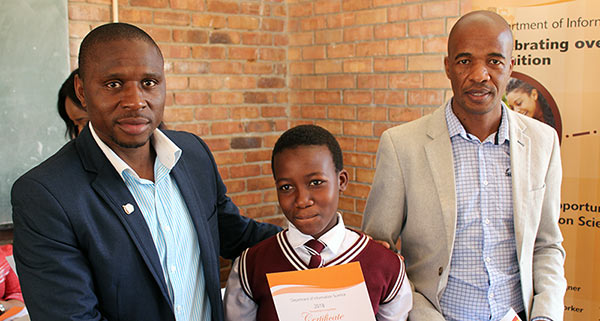
Dr Jan Maluleka (Storytelling and Preservation of Heritage Project Leader) and Prof Mpho Ngoepe (CoD: Information Science) with one of the learners from the schools with which they have worked.
"Traditionally, an African household will be large and the presence of elders in the family meant that there was always someone present to instil family cultural values to the young ones. This was mostly done through storytelling around the fire at night. In rural areas, we are witnessing the rise of child-headed households where children miss the most important steps of their early development."
Maluleka, who is the project leader of the community engagement (CE) project, Storytelling and Preservation of Heritage, says that empirical studies have shown that literacy levels are very low among children in rural schools. This is partly due to the lack of libraries in these areas, and the fact that children do not have someone to read to them from an early age at home.
"Literacy skills form a foundation on which the acquisition of knowledge in multiple domains is built. As a society if we are not investing in making sure children have literacy skills, we will be faced with a situation where we have adults who lack the literacy skills that serve a variety of everyday and more specialised functions."
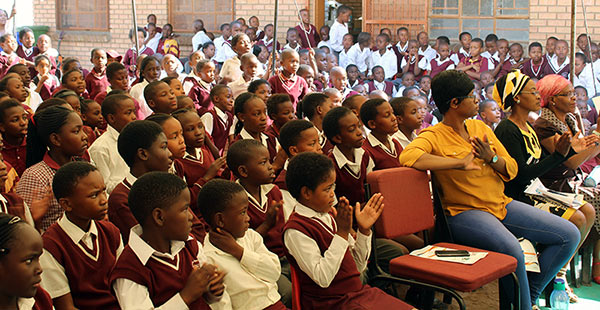
Learners listening to Unisa team members from the Storytelling and Preservation of Heritage Project.
The College of Human Sciences scholar says it is for these reasons that a CE project such as this one exists. It aims to largely revive storytelling in schools, and ensure that there are books available for learners and the community.
Speaking more on the Storytelling and Preservation of Heritage project, Maluleka explains that it is an amendment and extension of the Makgabeng Career Expo and Heritage Celebration. The Makgabeng project ran from 2013 until 2016 under the leadership of Prof Mpho Ngoepe. "The aim of the original project was to preserve heritage resources in the Makgabeng area. The short-term goal was to help learners in the area to decide about their future. The long-term goal was to develop a heritage centre in the area, with a view of harnessing the area as a tourism destination."
In 2018, Maluleka assumed leadership of the project. However, after realising that there was a similar project within the Department of Information Science, the project team decided to consolidate all activities of both projects. "That gave birth to the Storytelling and Preservation of Heritage project." The project team consists of Maluleka (Project Leader), Ngoepe (Project member and Researcher), Dr Samuel Mojapelo (Project member and Researcher), Dr Ngoako Marutha (Project member and Researcher), Prof Thomas van der Walt (Project member and Researcher), Marcia Nkwe (Project Administrator and research assistant) and Mahlatse Shekgole (Project Administrator and research assistant).

Covers of the books that have been distributed to schools
He also says that the Department of Information Science has been running storytelling festivals since 2009, and since then, storytellers from Indonesia, Cameroon, Argentina, Zimbabwe, Greece, Senegal, Nigeria, Palestine and many other countries have been part of their annual event. "Besides telling stories, these storytellers also conducted workshops where they share their knowledge and experience with the participants and learners from different schools. Therefore, the revised project has two domains, storytelling, and heritage preservation."
Maluleka says since 2018, the team decided to focus on a group of schools in the Limpopo province. These schools in rural Limpopo had little resources and very low literacy levels. Among those schools was a ZZ2 farm school in the Tzaneen area. The aim was to give the project team an opportunity to assess learners over time, which would produce empirical data that will be published as journal articles.
"To date, three volumes of stories by learners from different schools in the Limpopo province have been published. Furthermore, the project has produced three articles in accredited peer-reviewed journals. Moving forward, the project aims to involve master’s and doctoral students who will be conducting research in this field of research. It is also hoped that this project will inform curriculum transformation in the Department of Information Science as we are busy revising our undergraduate qualification."
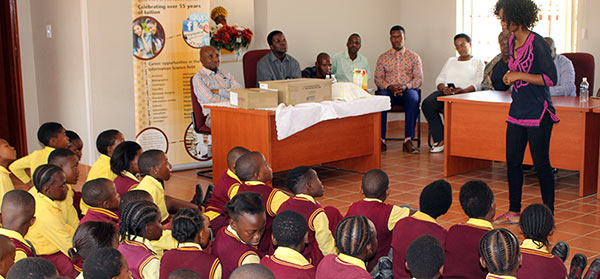
Learners listening to Unisa team members from the Storytelling and Preservation of Heritage Project
Regarding the impact of Covid-19 on the project, Maluleka says that the South African lockdown has had a huge impact on the 2020 plans. "Our project involves school learners and schools were among the first institutions to close down, even before the official lockdown. The team has constantly been in contact with the teachers of these schools to find ways of saving the year."
"What is possible at this stage is to get those stories that were being prepared for 2020 ready for publication, so once the learners are back at school, they will have them. Most importantly, the team and some of the school teachers see this as the opportunity to plan so that the shortcomings experienced in the previous years can be corrected. We are monitoring the situation at the schools very carefully, and together with the teachers, we will find new ways to navigate this challenging environment moving forward."
Maluleka concludes by saying that the project received additional funding from the National Heritage Council for three years starting from 2020.
* Compiled by Rivonia Naidu-Hoffmeester, Communications and Marketing Specialist, College of Human Sciences
Publish date: 2020-07-02 00:00:00.0


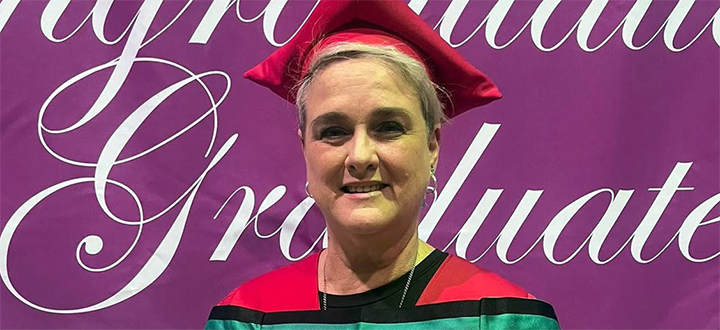 Shedding light on the well-being of ODeL facilitators
Shedding light on the well-being of ODeL facilitators
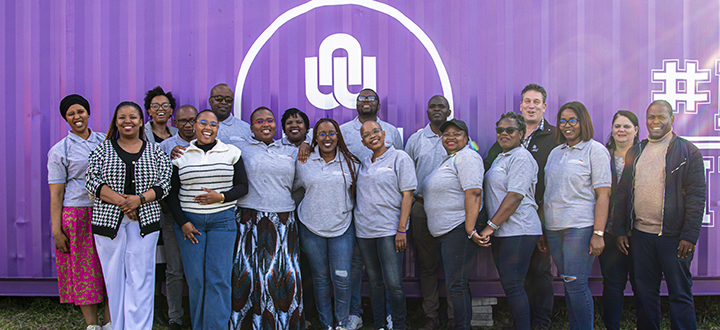 A giant leap for student success and retention
A giant leap for student success and retention
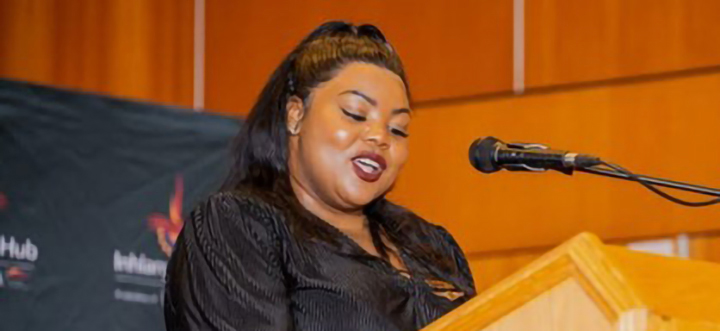 SWEEP: Where women entrepreneurs take the lead
SWEEP: Where women entrepreneurs take the lead
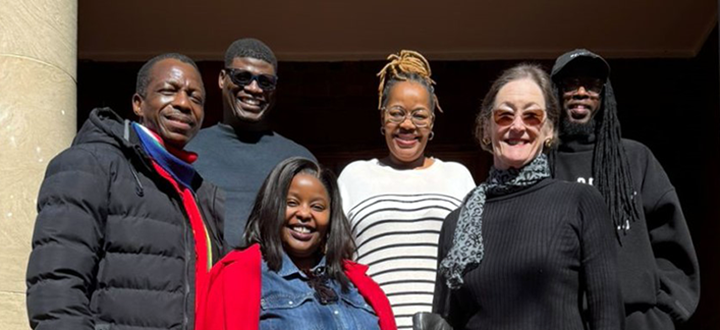 A sense of belonging and excellence nurtured through collaboration
A sense of belonging and excellence nurtured through collaboration
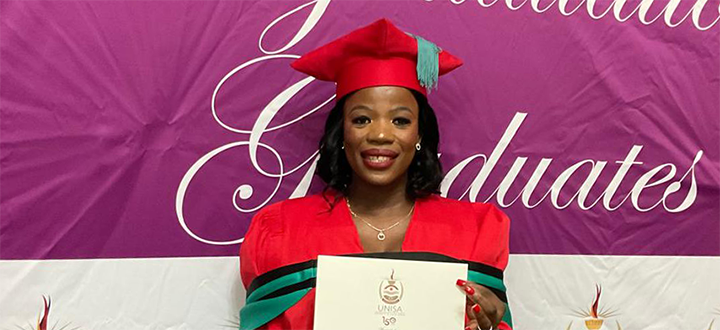 Wielding her Unisa PhD, Botswana educator champions early childhood development
Wielding her Unisa PhD, Botswana educator champions early childhood development